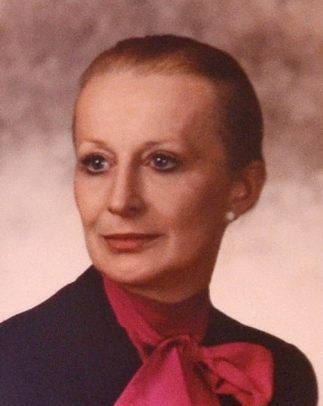‘A giant star in nursing’ gone: Remembering Dean Mitzi Duxbury

Mitzi Duxbury, who led the UIC College of Nursing as its fifth dean from 1983 to 1988, died in February. She was 87.
Duxbury left her mark on the college in ways that are felt today: She guided UIC Nursing into the burgeoning realm of nurse-led research, cemented an academic-practice collaboration with the University of Illinois Hospital and Health Sciences System, and created a fertile environment for new nurse researchers to grow.
“We just lost a giant star in nursing,” said Mi Ja Kim, who served in various administrative roles under Duxbury and succeeded her as dean. “She was a visionary leader who wanted to advance nursing science and showcase the nursing profession to society as a research-based practice discipline. Her leadership and support for faculty research were extraordinary and her expectation for excellence — equal to none — made the college’s research standing top-tier in the country.”
Duxbury, who held advanced degrees in educational policy and administration, understood the workings of a university, and in particular, of a health science center. At the time, nursing was not fully embraced as a science-driven discipline, but Duxbury would play a vocal role in changing that.
“Nurses have the unique opportunity — indeed, the responsibility — to advance the science of nursing,” she wrote in the January/February 1978 issue of The American Journal of Maternal/Child Nursing. “No one has the continuous access to the client that nurses have. No one has the opportunity for observation and data collection we have.”
Making a name for herself
Duxbury, who grew up in the small town of Cambria, Wisconsin, got her nursing diploma from Madison General Hospital in 1952. When her husband got drafted in the Korean War, they moved to Fort Riley, Kansas, where she developed an interest in maternal and infant care as a civilian nurse in the obstetrics ward of Fort Riley Hospital.
Several cross-country moves and three children later, she returned to Wisconsin, where she went back to school to get her bachelor’s degree. She loved school and saw it as a way to earn more money.
“There was a time when nurses were treated almost like nuns,” Duxbury told an oral historian from the University of Minnesota. “Pay them nothing but great respect.”
She taught at a technical college while earning her master’s degree in educational policy studies and her Ph.D. in educational administration from the University of Wisconsin-Madison.
Duxbury worked for March of Dimes from 1972 to 1977 as director of health personnel development, where her boss was Virginia Apgar, the inventor of the newborn-assessment tool, the Apgar Score. There, Duxbury developed what were affectionately called, “Mitzi’s Modules,” a series of educational modules designed to teach professionals about maternal and infant care.
This helped her develop a national reputation, and she was hired as assistant dean for graduate studies at the University of Minnesota in 1977 with a singular mission: establish a doctoral program for nursing. Facing resistance, she quickly got to work building up the faculty’s research enterprise and shepherded the program through final approval in 1982.
‘A nurse’s nurse’
In 1983, she accepted the deanship at the UIC College of Nursing, succeeding Helen Grace, PhD, MS ’65, FAAN.
Duxbury believed that practice informs research and vice versa, and she built a strong relationship with the University of Illinois Hospital, encouraging the hospital to start a fund for nursing research projects at the hospital. It was a vision for symbiotic academic and practice partnerships that the college continues to value and pursue today.
“Dr. Duxbury was a true nurse leader—most notably for her understanding of the inextricable link between academia and practice,” says UIC Nursing Dean Terri Weaver.
Karyn Holm, who was assistant dean/associate dean for practice under Duxbury and Kim, describes her as “a nurse’s nurse.” She recalls that Duxbury was one of the first nurses elected into the Institute of Medicine.
“She was able to stand toe-to-toe with anybody,” says Holm, now Vincent de Paul Professor Emerita Nursing at DePaul University. “That’s what she taught me to do.”
Because nursing was just gaining a foothold in academia, Holm says Duxbury was also critical to strengthening the college’s research reputation by training and then hiring promising nurse investigators.
“Her goal was to build a cadre of nurses with Ph.D.s on the tenure track,” says Holm. “That’s where students came into play; she created an environment where they wanted to stay on as faculty.”
After Duxbury left UIC, she went on to become a professor at the University of Wisconsin-Madison. Nearly 20 years later, she established two scholarships at UIC Nursing in perinatal, neonatal and midwifery.
As a PhD student and then young faculty member under Duxbury, Carol Ferrans says Duxbury helped transform the college into a national and international leader. Ferrans is now the Harriet H. Werley Endowed Chair for Nursing Research.
“She made us what we are today, and that is not hyperbole,” Ferrans says.
